The Future of Peace and Security – The Role of the OSCE
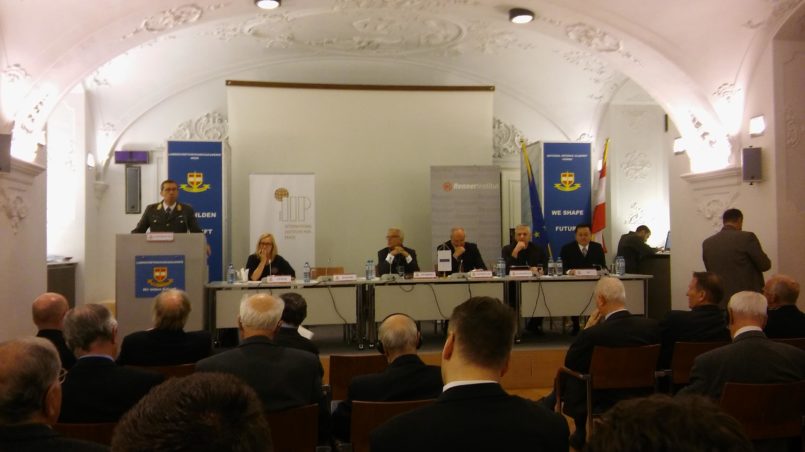
Event data
- Datum
- 14. 11. 2016
- Host
- Renner Institut
- Location
- Landesverteidigungsakademie Wien, Sala Terrena, Stiftgasse 2a, 1070 Wien
- Event-type
- Podiumsdiskussion
- Participants
- Christian Strohal, Sonderberater des österreichischen OSZE-Vorsitzes
- Xiaohui Du, Botschafter der Volksrepublik China
- Heidemaria Gürer, Leiterin der Abteilung für osteuropa, Südkaukasis, Zentralasien im BMEIA
- Gustav Gustenau, Direktion für Sicherheitspolitik im BMLVS, Verbindungsmann zum nat. Sicherheitsrat
- Sergey Makedonov, Experte des Russian International Affairs Council
- Florian Raunig, Leiter der Task Force für den österreichischen OSZE-Vorsitz 2017
- Hannes Swoboda, Präsident des international Institute for peace
In 2017 Austria will take over the chairmanship of the Organisation for Security and Cooperation in Europe – the OSCE. It has its seat in Vienna and it has 57 participating states. As such it is the largest security organisation in the northern hemisphere. It is currently involved in 17 field operations (including the Ukraine).
The OSCE crisis management functioned well in the Crimean crisis. 24 hours after the OSCE decision, an observation mission was on site. Today there are more than 1,000 workers in the Ukraine who write reports daily and help the local population.
The annexation of Crimea shook the predictability of and the trust in the conduct of states. This loss of confidence, in the concrete case in Russia, has to be overcome by dialogue, for example, through programmes such as the arms control initiative of the German Foreign Minister, Steinmeyer or also through cooperation in the field of cyber security.
Economic relations as well as the involvement of non-diplomatic actors (e.g. youth organisations or NGOs) have to be strengthened. The tight budget of the OSCE (which approximately amounts to the costs of the Ukraine operation) hardly allows a broadening of the operations and an increase of the budget has to be strived for.
The Panel of Eminent Persons, to which the German Chairman of the Munich Security Conference, Wolfgang Ischinger, belongs, has been working on proposals for improvements within the OCE since 2015.
Nagorno-Karabakh has not yet been resolved and has once again flared up since the Ukraine conflict. Until 2008 South Ossetia was supported by the OSCE, Abkhazia by the UNO. The two organisations have no longer been present since the Georgian war. Transnistria, according to Gürer, is the next to be resolved. The so-called 5+2 talks have taken place. The impact that the newly elected pro-Russia President of Moldavia, Igor Dondon, will have on this process remains to be seen.
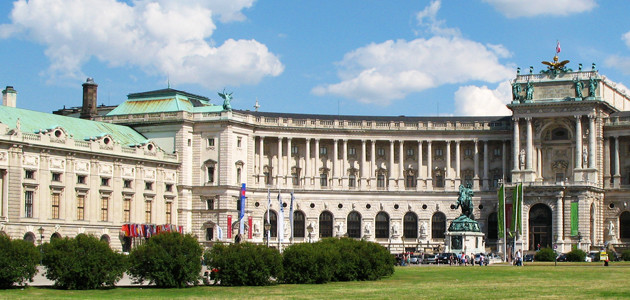
The OSCE and Austria’s security interests
From the perspective of the Austrian Minister of Defence, the OSCE has a subsidiary role, according to Brigardier Gustenau. In order of priorities, the Ministry first looks to the European Union, then the CEDC, with whose help a stabilisation of the west Balkans and a solution to the migration crisis is being strived for. NATO is next, followed by the UNO, the latter above all as regards the African continent. The OSCE becomes involved in strategic considerations.
In the Common Foreign and Security Policy (CFSP), Austria plays a subsidiary role considering the demands of the migration crisis. The current position of the Defence Minister, Doskozil, is that Austria cooperates with other states in cases of national interests and stays out of the conflict bweteen NATO and Russia.
In a study carried out by the Ministry in which Austrians were asked about their position to NATO and Russia, a majority of those questioned reported an imbalance of Europe’s orientation towards NATO and away from Russia. Europe should become more involved in Russia, the foreign policy towards Russia should be friendlier, the sanctions should be lifted.
In response to the question whether Austria should play an active role in a resolution of the conflict, those questioned were divided. In the Middle East the situation is presented clearly: the USA is the main cause of wars – far ahead of Russia and Turkey.
The communication channels to the USA should once again be built up. The CEDC is currently the most important consultation committee. According to Gustenau, the consultation format there could be considered for the OSCE. The neutrality of Austria is possibly also a type of „export hit“: Moldavia has already submitted an enquiry to get acquainted with the model and Serbia, Bosnia-Herzegovina and even Belarus appear to be interested.
The Russian Perspective
In the Charter of Paris from 1990, the content of which was the new order in Europe after the fall of the USSR, NATO is not named as an integral element. It is said that there were unofficial agreements that NATO would not expand to the east. How many accessions have there been since then? Today NATO is in the Baltic region, on the border to Russia.
The responsibility for the Caucasus conflicts is divided because, in Georgia and Nagorno-Karabakh, both sides breached valid contracts. The two great collapses after World War II – Yugoslavia and the Soviet Union – have shown that Stalin’s borders do not work.
From a Russian perspective, the end of the Soviet Union was not a defeat – as the west obviously defined it – rather a change.
Putin was not the first to raise criticism about the expansion of NATO. In 1993 Yeltsin, and in 1997 Tschubais, were not exactly happy about this advance towards the east. Putin’s speeches from 1999 in Istanbul and in the German Parliament from 1999 and 2007 respectively are almost identical and are clearly recognisable as a sign of cooperation.
Makedonov considers the election of Donald Trump as an opportunity for a new beginning in the relations to the USA. He is, however, not so naive as to believe that suddenly everything will be better. Regarding the involvement of Russia in Syria, he explains this by referring to the fact that in November 2014 the spread of the Islamic State also became a danger for Russia and the governing head of state called for help.
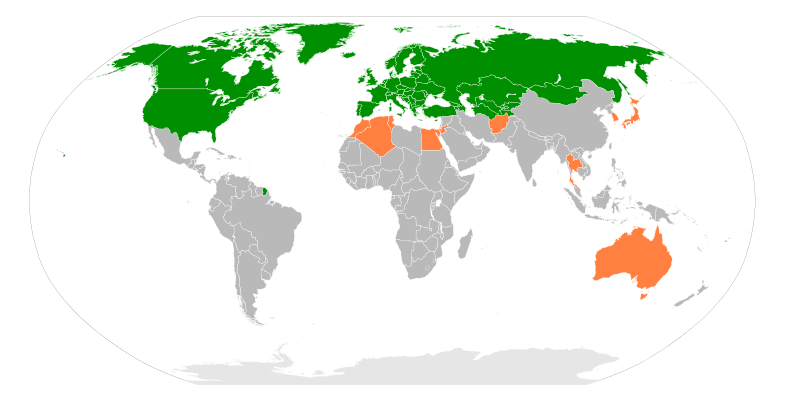
China and the OSCE?
The German Foreign Minister Steinmeyer invited China to the OSCE economic conference, Connectivity, in Berlin, where, among others, the New Silk Road (I have already reported on this project) was discussed. Further, there is direct contact with many partner states of the OSCE. The Chinese Embassy in Vienna has a good relationship with the office of the organisation in Vienna.
Since 1990 the world is once again facing the beginning of a new chapter: many dangers will be encountered. The development of the world has to be correctly understood. The world is becoming multipolar, the current tendency of isolationism will not provide the best answers to today’s crises. Therefore, it is necessary to develop a new version of security: comprehensive, general and cooperative.
A View of the Chairmanship
The head of the task force for the Austrian chairmanship, Florian Raunig, praised the best prepared chairmanship of all times, namely Switzerland in 2014 and then the crisis in the Ukraine occurred and topics other than those prepared suddenly dominated the daily agenda.
In 2015 in Macedonia there was, within a short period of time, a real danger of ethnic conflicts. Under the Serbian chairman-in-office at the time there was a prompt intervention by the OSCE and soon afterwards Macedonian and Albanian flags could be seen for the first time at demonstrations.
What does it mean to have the chairmanship of this organisation?
One is there for everyone regardless of how great or small the problems are.
General Secretary Zannier described the OSCE as „57 non-like-minded states“ – in contrast to, e.g. NATO. One task of the chairman is to promote consensus. The main task of the chairman is not to solve problems but rather to create an atmosphere in order to enable solutions. The chairmanship also involves responsibility towards the organisation itself in order not to damage its reputation.
And what makes a chairmanship successful?
Raunig considers the three main tasks of the Austrian chairmanship to be
- the creation of framework conditions for successful negotiations,
- the fight against radicalisation – with a focus on young people – here there is extensive consensus within the OSCE and, as such, there is a good chance of substantial results and
- the strengthening of trust in the organisation.
Why did Austria even apply for the chairmanship?
One reason is that its headquarters are in Vienna. Further, small countries are greatly interested in strong organisations because they can participate in them. And, if one wishes to have a say somewhere, one should also assume responsibility for the bigger picture.
For Raunig consensus as a solution between conflicting interests holds both strengths and weaknesses. The progress may be less than that hoped for. Members abide by concluded contracts. In the meantime the OSCE is the only security organisation in which all significant powers still participate.
Former Foreign Minister Erwin Lanc, in his speech, urged the audience to continually raise awareness of the memories of the war. The majority of living persons today only know about the horrors from stories. Europe has to take care that this remains so.
Translation into English: Donna Stockenhuber
Credits
| Image | Title | Author | License |
|---|---|---|---|
 |
OSZE | Christian Janisch | CC BY-SA 4.0 |
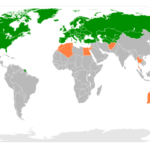 |
OSCE members (green) and partners (orange) | Sven | CC BY SA 4.0 |
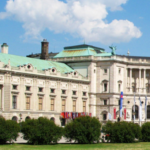 |
The seat of the OSCE in the Wiener Hofburg | Andrew Bossi | CC BY-SA 2.5 |
